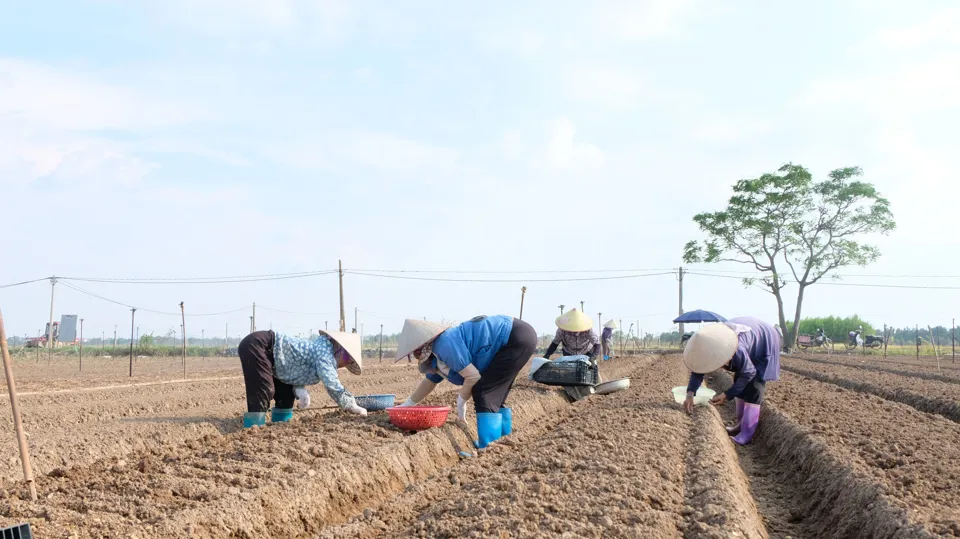Hanoi aims to boost agriculture after typhoon strikes
Local authorities are working closely with farmers to restore the production areas.
In the aftermath of Typhoon Yagi, the Hanoi Department of Agriculture and Rural Development, through the Hanoi Agricultural Extension Center, is working to restore agricultural production to rehabilitate the livelihoods of affected residents and ensure stable supply.
| Officials from the Hanoi Agricultural Extension Center guide residents of Bac Tu Liem District to restore orchards damaged by flooding. Photo: Hanoimoi Newspaper |
Farm recovery efforts on track
Vu Thi Huong, Director of the Hanoi Agricultural Extension Center, said they have called on local businesses to donate seeds, fertilizers, and biological treatment products for households affected by Typhoon Yagi in Thuong Tin, Ung Hoa, Quoc Oai, and Dan Phuong districts.
To date, they have collected eight tons of organic fertilizer, 1,300 packets of 200g Emuniv soil and livestock treatment products, 72 liters of Clearshrim AP environmental treatment chemicals, and 123 kg of various vegetable seeds (including kohlrabi, cabbage, and peas), all of which have been distributed to residents in these districts.
"Providing seeds and materials to farmers at this time helps them overcome difficulties caused by the storm. We hope that the households receiving this assistance will quickly resume production," Huong said.
Le Thanh Tien, from Vinh Loc Village in Thu Phu Commune, Thuong Tin District, is one of many farmers who have benefited from the department's policy. He said his vegetable crop, which was almost ready to be harvested, was completely submerged during the typhoon.
But after the fields were drained, Tien and other farmers in the commune received short-term vegetable seeds and fertilizer from the Hanoi Agricultural Extension Center and some local businesses. "I hope that this coming harvest, with higher prices and lower costs for seeds and fertilizers, will help us recover from the losses caused by Typhoon Yagi," Tien added.
In Son Cong Commune, the storm damaged more than 145 hectares of rice, 47 hectares of crops, and nearly five hectares of aquaculture.
To help the farmers recover, the center and some local businesses provided 44 kg of vegetable seeds, 400 packets of Emuniv waste treatment products, 18 liters of Clearshrim AP environmental treatment chemicals, and two tons of organic fertilizer.
The local authorities also distributed seeds and fertilizer to 250 households so they could plant crops and get their products to market as quickly as possible.
Financial support aids farmers’ recovery
| Local farmers planting vegetables. Photo: Tung Nguyen/The Hanoi Times |
The Dong Cao Red Grapefruit Cooperative in Me Linh District reported that the cooperative actively guides its members on selective harvesting strategies to minimize losses. This includes removing broken grapefruit branches and focusing on the recovery and care of the remaining plants.
Luu Van Phuong, Director of the Dong Cao Red Grapefruit Cooperative, said that to help farmers resume production, the cooperative has provided technical advice, new seeds, and financial support.
He urged the relevant authorities to postpone or defer loan repayments for cooperatives and households affected by Typhoon Yagi.
Vu Thi Huong, Director of the Hanoi Agricultural Extension Center, emphasized that in addition to providing seeds and agricultural inputs, the center has set up working groups to assist farmers in mitigating the damage caused by the storm and resuming production. At the same time, the center helps farmers access loans from the city's Agricultural Promotion Fund.
"To deal with the aftermath of Typhoon Yagi and restore production, we have asked the National Agricultural Extension Center (Ministry of Agriculture and Rural Development) to provide seeds and materials to farmers affected by the storm," Huong stressed.
In 2024, Hanoi targets an agricultural growth rate of 2.5% to 3%, said Nguyen Xuan Dai, Director of the Hanoi Department of Agriculture and Rural Development.
The department has issued six directives focused on restoring crop production after the floods. "Local authorities are working with farmers to stabilize production in vegetable, fruit, and livestock regions," he stressed.
Meanwhile, the municipal Department of Agriculture and Rural Development is coordinating with localities to monitor agricultural production and input costs to ensure stable supply. At the same time, it prevents price manipulation that could harm residents' livelihoods, Xuan Dai said.


.jpg)










